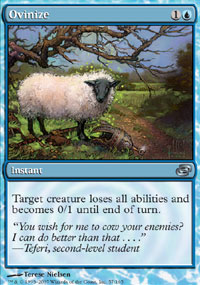Today I head-judged the prerelease of Planar Chaos, the latest Magic: The Gathering expansion. The prerelease at the FUNtainment Game Center here in Berlin was attended by 71 players, a fairly disappointing number after the strong Time Spiral prerelease. Some people blame The Burning Crusade, the latest World of Warcraft expansion, out this week. Personally I also think the traditionally weak month of January plays a fairly important role.
 Speaking of World of Warcraft: One of the most funny cards of the new expansion is Ovinize, the color-shifted version of Humble. It allows you to “sheep” a creature, essentially remove all its abilities temporarily. One the one hand this resembles the old card Ovinomancer, which created Sheep tokens, on the other hand it plays with a similar concept in MMORPGs like World of Warcraft.
Speaking of World of Warcraft: One of the most funny cards of the new expansion is Ovinize, the color-shifted version of Humble. It allows you to “sheep” a creature, essentially remove all its abilities temporarily. One the one hand this resembles the old card Ovinomancer, which created Sheep tokens, on the other hand it plays with a similar concept in MMORPGs like World of Warcraft.
The color-shifted cards are an interesting concept: Reprinting old cards in another color, where they could have been printed if a few decisions had been different.
I had a few interesting calls:
- The interaction between Vesuvan Shapeshifter and Shaper Parasite. The Shapeshifter is turned face up and copies the Parasite. Question: Does the “Turned-face-up” ability of the Parasite trigger on the copy. I ruled in analogy to comes-into-play abilities and copy effects: The creature has all the copied characteristics before it is turned face up, so all triggered abilities that trigger on it being turned face up will trigger. Later the Time Spiral FAQ confirmed my ruling.
- I botched the interaction of Ovinize and Vanishing. The rules text for Vanishing reads in part (according to the Rules Primer):
502.60. Vanishing
502.60a Vanishing is a keyword that represents three abilities. “Vanishing N” means “This permanent comes into play with N time counters on it,” “At the beginning of your upkeep, if this permanent has a time counter on it, remove a time counter from it,” and “When the last time counter is removed from this permanent, sacrifice it.”
For some reason I assumed that the third ability was included in the second one like this: “At the beginning of your upkeep, if this permanent has a time counter on it, remove a time counter from it. When the last time counter is removed from this permanent, sacrifice it.” Now the question was some like: “If I play Ovinize on a card with Vanishing and one time counter in response to Vanishing’s first triggered ability, what happens?” My ruling was that the last time counter is removed and the card with Vanishing is sacrificed, but any “leaves-play” abilities on the card don’t trigger. The correct ruling is that the last time counter is removed, but the permanent remains in play. At the time the counter is removed, the permanent has no abilities, in particular it doesn’t have Vanishing and so no “Last counter removed, then sac” ability.
- Player A had played Hunting Wilds. Some time later his opponent, player B, noticed that A’s graveyard was empty. A looked through his hand, and library and found a copy in the latter. Since he wasn’t sure whether he played one or two copies he wanted to see his decklist. After a short lecture that a player should under no circumstances look through his library without asking a judge first, I fetched the deck list and determined that the player only had one Hunting Wilds in total, so this one had to be the one played earlier. After a brief interview I was convinced that this was an honest mistake and the card had been shuffled into the library when the Forests had been searched for as part of resolving Hunting Wilds. The card was placed in the graveyard, the library was shuffled, and I issued a Warning for Procedural Error – Major.A case could be made for leaving the card in the library (leaving the game state as is is the default remedy if a decision point has been passed). But since the players had placed the card in the graveyard themselves in mutual agreement before a judge was called, I considered this to be the solution both would be more comfortable with, and let the card remain there. I think it was Scott Marshall who proposed to use a remedy both players of a match agree on instead of the normal remedy if this seems suitable. While I was initially opposed to it, this was a good example where this makes sense. I am still undecided on the issue, though.
Leave a Reply